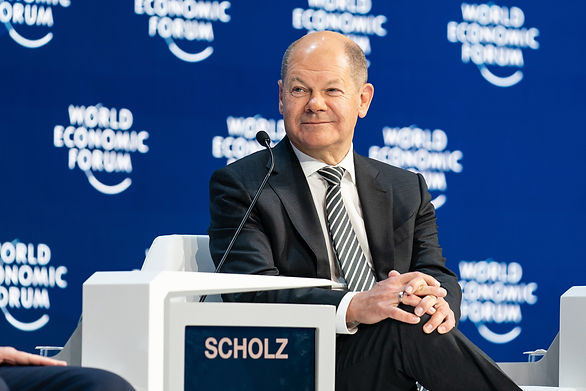The German Budget Blunder

Source: Flickr
German Chancellor Olaf Scholz is not particularly known for frequent displays of emotion, having been nicknamed “Scholzomat” for his mechanical and often stiff public demeanor. It is thus not a surprise that his reaction to a question by a reporter in a press conference with Italian Prime Minister Giorgia Meloni gained as much attention as it did. With Meloni asked whether Germany is still considered a “reliable partner” by the Italian government, Scholz appeared visibly taken aback and irritated (the moment).
The reporter was, of course, referring to the bombshell ruling by Germany’s constitutional court on November 15th that has since thrown Berlin into chaos. In a judgment from Karlsruhe, the court held that one of the pillars of the governing coalition’s environmental strategies, specifically its plan to repurpose €60bn in unspent emergency COVID-19 aid to its Climate and Transformation Fund (KTF), was unconstitutional (POLITICO). The government was accordingly forced to immediately freeze all payments from the KTF, dealing a “huge hole” into its financing, given plans to spend as much as €177bn over the coming three years on infrastructure modernization and the green energy transition (FT). As such, Mr. Scholz is now facing a budgetary crisis that has not only thwarted his government’s political ambitions but also raised doubts about Germany’s fiscal prudence and financial credibility.
The landmark ruling was reached following a budget maneuver agreed upon by the three parties in Mr. Scholz’s coalition (the Social Democrats, the Greens, and the liberal Free Democrats) in December 2021 to best leverage funds allocated during the COVID crisis for diverse priorities. Given the intent of Germany’s Finance Minister, Christian Lindner, to return to the constitutional debt brake rule, which had temporarily been suspended during the pandemic, this year, the government changed its accounting principle. Concretely, it decided to make borrowing count towards the deficit only in the year the policy is passed. The €60bn transfer of funds would thus have counted only toward the deficit for 2021, rather than 2023 and 2024, when most of the spending was set to occur. Consequently, Mr. Lindner could return to the debt rule, which restricts the public deficit to 0.35% of GDP, this year (CNBC).
It is exactly this budgetary gimmick that has now come back to haunt the governing coalition. With the constitutional court arguing that the debt ceiling could only be exceeded in case of an emergency, not to transfer funds to a climate fund, and that the government’s change in its accounting practice was unconstitutional, German fiscal policy has suddenly found itself severely restricted (CNBC).
The political fallout has been swift and severe. Thorsten Frei, an MP for the CDU, asserted that “this budget and coalition crisis threatens to turn into a crisis of confidence in the effectiveness of our state” (FT). Fundamentally, it effectively summarizes the challenges Mr. Scholz has faced in productively crafting policy that reflects the distinct priorities of the parties in his three-way coalition and allows each of them to present specific policy victories to their base.
The ensuing budgetary crisis has furthermore reinvigorated the debate about the merits of Germany’s debt brake, which since 2009 has been enshrined in the country’s constitution. Adopted in order to break from the profligacy of the past, it was initially celebrated as a victory for responsible public finance and hailed as a “shining example” of European fiscal constraint (Truger). After Germany successfully ran balanced budgets and cut its debt-to-GDP ratio (60% in 2019), proponents of the clause were eager to encourage eurozone partners to adopt similar policies. This cumulated in the Fiscal Pact of 2012, which set stricter budgetary guidelines for all eurozone members.
Fourteen years later, however, the debt brake has been criticized for hindering desperately needed investments in German infrastructure and industry modernization. Jens Südekum, a Professor at Heinrich Heine University, has referred to it as “the biggest mistake in German economic policy in the last 20, 30 years”, impeding Europe’s biggest economy from financing its energy transition and jeopardizing its strategic geopolitical goals (FT). Especially its crucial military and financial support of Ukraine has since come into question, raising the concern of whether European countries would continue to aid Ukraine, without Germany leading by example (Economist).
Faced with political and legal challenges to the coalition’s priorities, Mr. Scholz must now devise a solution. In addition to reviewing current spending and potentially reducing inefficiencies and superfluous handouts, some have proposed the government establish a fund akin to that established in the wake of Russia’s invasion of Ukraine in February 2022, which raised €100bn to revitalize the Bundeswehr by amending the constitution to exempt the fund from the debt brake (Economist). This could provide a legally sound avenue to enable debt-financed investments in infrastructure and climate resilience. Left-leaning politicians have instead called for a termination of the debt brake, arguing it is “no longer in step with the times” (FT). Regardless, Mr. Scholz must find ways to cooperate with the Christian Democrats, the main opposition party, to find common ground and form broad political consensus about the path forward. Ultimately, it is critical that the government now acts in lockstep and quickly agrees on a solution in order to restore Germany’s fiscal credibility, calm investors, and reassure allies that Germany will not renege on its international commitments.















Comments